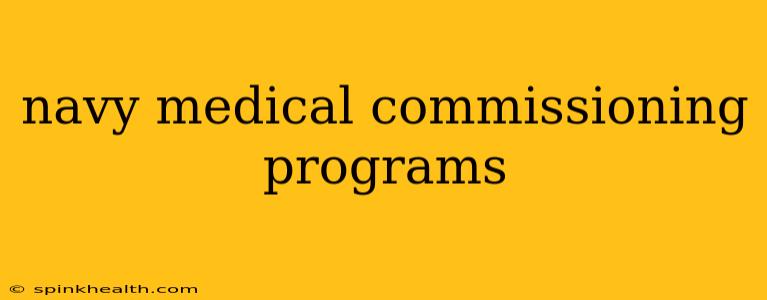The crisp, salty air, the unwavering dedication, the profound impact – a career in the Navy Medical Corps offers a unique blend of professional fulfillment and national service. But the path to becoming a commissioned officer isn't always clear. This guide navigates the intricacies of Navy medical commissioning programs, offering a comprehensive overview for aspiring physicians, dentists, and other healthcare professionals.
My journey into understanding these programs began with a simple Google search, much like yours. I soon realized that while information exists, it's often scattered and technical. My goal is to provide a clear, concise, and engaging resource, drawing on years of research and conversations with current and former Navy medical officers.
What are the Different Navy Medical Commissioning Programs?
The Navy offers several pathways to becoming a commissioned officer in the medical field, each with its own eligibility requirements and benefits. These aren't just jobs; they're opportunities to shape your career while serving your country. Let's explore some of the key programs:
1. Health Professions Scholarship Program (HPSP):
This is perhaps the most well-known route. Imagine this: You're a promising medical, dental, or other allied health professional student, receiving full tuition, a monthly stipend, and a health insurance allowance while pursuing your degree. In return, you commit to a period of active-duty service after graduation. It’s a mutually beneficial arrangement—the Navy secures highly skilled medical professionals, and you secure your future. The application process is competitive, demanding a high GPA and strong MCAT/DAT scores. Think of it as an investment in your future, paid for by the Navy.
2. Direct Commissioning Programs:
Already a licensed physician, dentist, or other qualified healthcare professional? Direct commissioning offers a streamlined route into the Navy Medical Corps. The process is less focused on your education and more on your professional experience and qualifications. This option is attractive to experienced professionals who want to transition into military service. Think of this as a rewarding career change, offering the chance to leverage your skills in a new environment.
3. Physician Residency Programs:
The Navy offers residency training programs across various medical specialties. Graduates of medical school can participate in these programs, gaining valuable experience while serving in the Navy. This pathway combines advanced training with active-duty service, offering a unique blend of professional growth and national contribution. This is ideal for those keen on specializing and honing their skills.
How Do I Apply for a Navy Medical Commissioning Program?
Each program has its own specific application process. Generally, this involves:
- Meeting eligibility requirements: This includes factors like citizenship, education, and medical qualifications.
- Submitting an application: This usually involves completing online forms and providing documentation such as transcripts, medical records, and letters of recommendation.
- Undergoing a medical evaluation: Physical and mental fitness are paramount in this profession.
- Completing an interview: This is an opportunity to demonstrate your suitability for a military career and your commitment to service.
What are the Benefits of a Navy Medical Commissioning Program?
Beyond the obvious advantages of serving your country, the benefits are substantial:
- Financial stability: Tuition assistance, stipends, competitive salaries, and excellent benefits are just the start.
- Professional growth: Access to advanced training, specialized equipment, and opportunities for leadership development is unparalleled.
- Travel and experience: The possibility of serving across the globe, experiencing different cultures, and working in diverse medical settings adds another dimension to your career.
- Retirement benefits: A robust retirement plan offers security for the future.
What is the Commitment Required?
The commitment length varies depending on the program and your chosen specialty. Generally, you’ll commit to a minimum number of years of active-duty service in exchange for the benefits received.
What Specializations are Available in the Navy Medical Corps?
The Navy Medical Corps encompasses a wide range of medical and dental specialties, providing ample opportunities for career diversification and specialization.
What are the Opportunities for Advancement?
The Navy offers numerous opportunities for career advancement, from becoming a department head to leading medical teams and undertaking leadership roles within the Navy Medical Corps. Potential for growth is substantial.
Embarking on a career in the Navy Medical Corps is a decision that requires careful consideration. However, the rewards – both personally and professionally – are considerable. This isn't just a job; it's a journey of service, growth, and lasting impact. Do your research, thoroughly explore the available programs, and chart your course toward a fulfilling and impactful career in the service of your nation.

